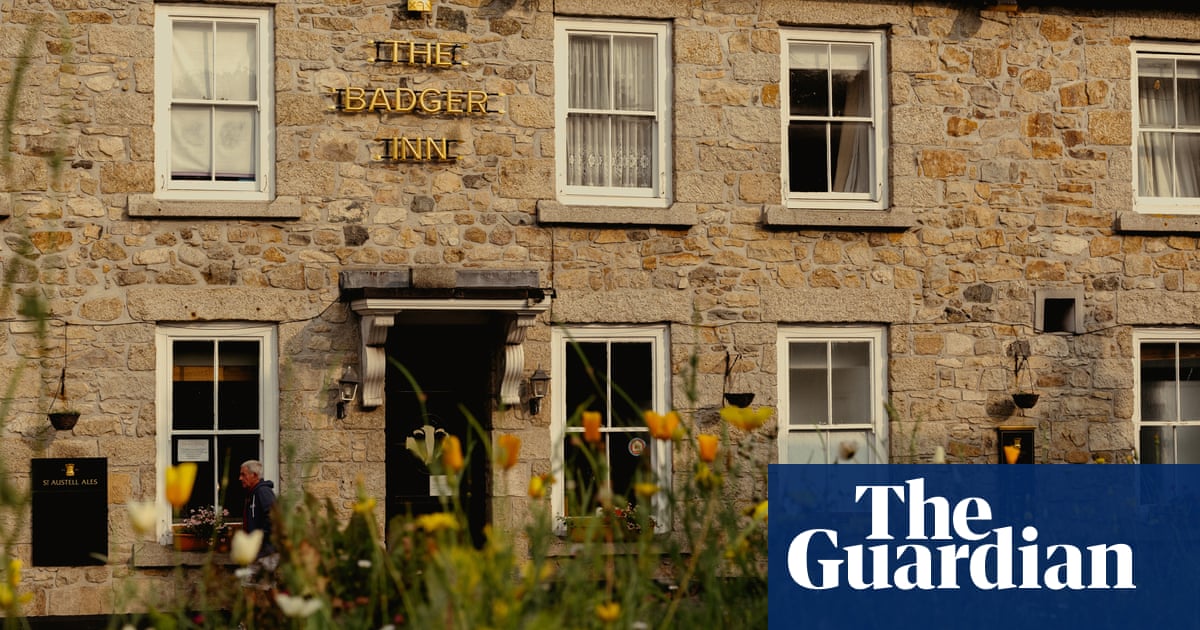
“Farmers certainly don’t want to see food poverty – we want to see food that’s affordable,” says Ian Harvey, a dairy farmer. “But at the same time, we want to ensure that there’s absolute fairness throughout the supply chain.” Farms are under extraordinary financial pressure, he says.
On Wiggaton Farm, near North Petherwin in the North Cornwall constituency, about 170 Holstein friesian and Ayrshire cows are nosing between tufts for the sweet new grass they like the most. “It’s amazing how they don’t pull the grass out of the ground,” Harvey says. “They wrap their tongue around it and then tear it off.”
Harvey’s farm is at the start of the food supply chain and the beginning of the Guardian’s journey through the rural constituency to the small town of Camelford, where hundreds of people rely on the community larder, an open-access food bank.
The dreamy impression of this beautiful corner of England taken away by summer tourists is a far cry from the cost of living crisis faced by local people. The Conservatives are defending a 16,000 majority, bloated by now-faded enthusiasm for Brexit, and while people are mostly shy about their voting intentions, the bookmakers have the Liberal Democrats odds-on to win.
Harvey’s cows send about 3,500 litres of milk a day to the UK’s biggest cheese factory nearby to produce Cathedral City and Davidstow cheddar. “The cost of living crisis has put pressure on the value of our end products. We’ve seen people trade out of brands into supermarket-owned brands meaning that slight premium is not delivered back to farmers,” he says.
In addition, Harvey says, high interest rates coupled with rising fuel prices and increased costs of inputs such as fertiliser “are creating extraordinary financial pressure” on farmers. The post-Brexit switch from EU subsidies for simply owning land to a regime where farmers are paid for environmental improvement is a good idea, he says, but delays have left farmers struggling. “The delivery has been poor and farming incomes have been challenged in the intervening period.
“We need long-term policies that people can shape their lives and businesses around,” Harvey says, not the current short-term politics.
In nearby Poundstock, Jill Faiers, an organic vegetable grower, is harvesting Cambridge strawberries, pale but deliciously sweet. Willow hedges and birdsong surround the crops of sweetcorn, kale, leeks, onions and apples on her five-acre patch. She believes deeply in the value of good food, but says she barely makes a living from the veg boxes she has sold for 20 years.
“Food is medicine basically, and everybody should be able to afford good quality food,” she says. “But that’s a bit chicken and egg. If everybody wasn’t struggling on really low wages, then they would be able to afford better food, and good quality food makes good healthy folks. What is the point in almost encouraging people to eat shit, and then sending them to a totally overwhelmed NHS?”
Faiers will vote for the Green party. “I can’t do tactical voting. We need a bloody revolution. But failing that in July, we need the Tories out and a progressive alliance.”
Twelve miles away, just outside Camelford, India and Spencer Rabey also have a vision to provide good food to more people though a community market garden on their 15-acre farm, which also hosts tourists in tents and camping pods.
They applied for levelling up funding to build a food-packing area and disabled toilets. “They said we ticked all the boxes and were definitely going to get it,” said India. “We’d actually recruited for the new jobs. Then they said, actually, we’ve been oversubscribed, and we’re not giving you anything. It really left us in the lurch. We hope we will still be able to do it, but it will take longer.”
Spencer says the aim is also to help improve mental and physical health: “There’s a real need here, and being outside, coming together and growing food is really beneficial.” Like his new puppy Molly, he remains irrepressibly enthusiastic, walking the land and showing off the dozens of free-range hens, black pigs, a polytunnel full of tomatoes, and a new cider orchard.
“It’s just magical – I really love it. And you’ve got to see the hobbit house!” he says, pushing through the shrubs to reveal a hollow amid the roots of a large tree down by the a river, which he hopes will become part of a forest classroom for schools.
But the cost of living crisis has hit them, too. “Our mortgage has gone from £1,000 to £1,650,” says India. “So the money we could invest in the business is just going to the bank.” Spencer says: “Sadly I don’t see any real benefit after 14 years of Conservative leadership. I really want to see more visionary leadership from any of the political parties.”
A short walk into Camelford and there are few signs of the election in the old stone-built town, which has a population of about 1,000. A few Lib Dem posters for candidate Ben Maguire are on display. The only Conservative one for Scott Mann on obvious view is in the window of Camelford Conservative Club.
Food is also an issue here, where the former NatWest bank has been converted to a community larder. It usually opens every Wednesday enabling anyone in the local area to pick up basics such as pasta, rice, tea and hygiene and sanitary products, but is now being renovated after winning a £90,000 levelling up grant. There is also a “fresh food fill-up” on Saturday, offering short-dated food donated by supermarkets through the FareShare charity.
“I never thought we’d have to continue after the pandemic – it’s disgusting,” says Tina McGrath, a trustee of the Old Bank and Community Larder group. She says 200 to 300 people a week come to get food for their families, many of whom are in work.
“We have queues up the street,” she says. “Our vision is not to be needed at all. But it has increased since Covid due to the economic crisis, especially among older people and it takes a lot for them to come through the door, as they are very proud.”
Peg Ellison, a former school cook, says: “The cost of food is just astronomical. I have had to use the food bank due to being out of work and my daughter has had to use it too. It’s embarrassing. I have never had to ask for help.”
The number of food banks in Britain has soared since 2010 and they now outnumber public libraries, while the Conservative government’s food strategy published in 2022 was condemned by its own lead adviser for failing to adequately address critical issues such as food poverty, obesity, animal welfare or the climate emergency.
McGrath says she is undecided on who to vote for, but adds: “Whoever takes on the role is going to struggle to turn this around – we are in a crisis. I don’t think any party is strong enough for the transformational change needed.”
Another problem raised by local people is that there is no supermarket in the town. “The nearest one is a 30-mile round trip,” says Rob Rotchell, the mayor of Camelford and leader of the town council, all of whose members are non-political independents. “That’s £10 in fuel and if you are on minimum wage or benefits, as many are, that’s bad news. And [if you don’t have a car] the bus service is near nonexistent,” he says.
Rotchell has just removed two Reform UK posters that had been attached to public railings and a lamp-post, in contravention of election rules. He will vote Lib Dem, having served as a county councillor for the party in the past.
From farm to fork, the constituents of North Cornwall are suffering the consequences of a food system that does not work for them. Farmers face rising costs and climate challenges, shoppers face rising prices, and low incomes and lack of access to good food harms health, placing more pressure on the NHS.
As well as the lack of a supermarket, three other issues come up repeatedly in Camelford: the failure to build a bypass, the cost of housing, and access to healthcare. On the day the Guardian met Bronwen Hockerday, a librarian, she said her elderly mother had had to wait 22 hours for an ambulance after falling and breaking her hip. The nearest hospital is 40 miles away.
At the Camelford Clickers knitting group meeting in the library, Kirsty Ferguson said her flat-hunting son had recently found only 23 available in the entire county of Cornwall. “They need to limit second homes: there are so many taking over our towns and villages.” She was undecided on how to vote, but said the television debates had been “laughable”.
Stephen Bond, who works at the Cornwall Model Boats company in the town, mentions the bypass. “We have been crying out for it for 30 years – the noise and air pollution is unbelievable.” It is the only part of the 191-mile Atlantic highway route that narrows to a single lane, he says. “When [the Conservatives] cancelled HS2, they said there would be all this money for infrastructure: where did it go?”
“I, like many people, was sold on Brexit and voted leave, and voted Conservative at the last election,” he says. “But I am very disappointed and I can’t vote Tory again. We need a change.”
Rural England has long been a Tory heartland, regularly returning “true blue” MPs, and at the 2019 election 46% of voters in rural counties voted Conservative. But rural Tory dominance is clearly under threat, from left and right.
The Guardian encountered one supporter of Nigel Farage’s Reform party, who said: “We’ve got to give them a go. But don’t quote me on that. My neighbours might not like me.”
However, many people expressed no interest in the election at all, often saying politicians were all the same and would not make any difference to their lives. “I like the politicians who tell the truth – so that’s none of them,” said one customer at the local butcher.












